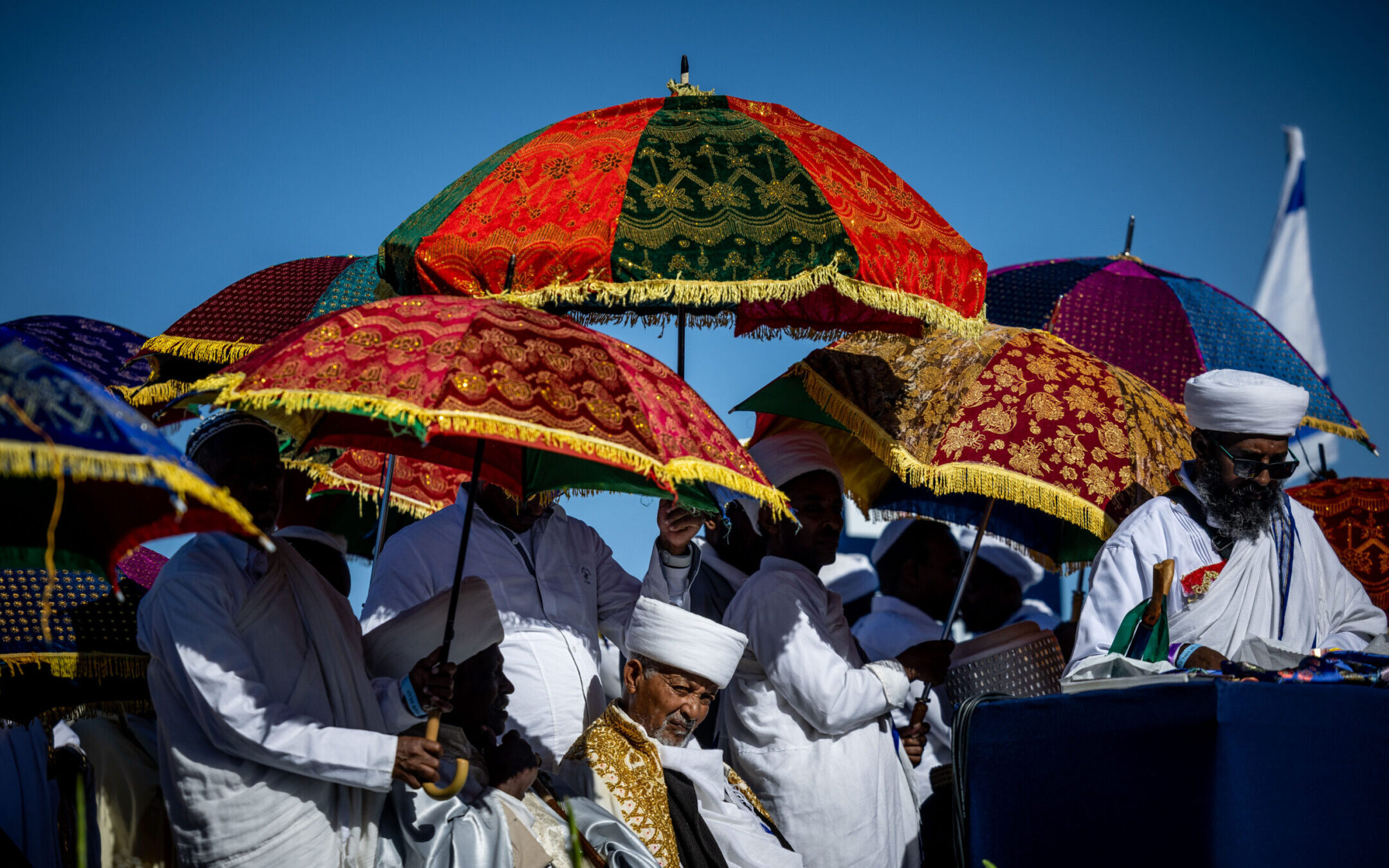Ethiopian Israelis celebrate Sigd holiday under the shadow of war
A public celebration in Jerusalem of the Ethiopian Jewish holiday celebrating yearning for Israel was canceled

Thousands of Ethiopian Jews take part in a prayer of the Sigd holiday on the Armon Hanatziv Promenade overlooking Jerusalem, Nov. 23, 2022. (Yonatan Sindel/Flash90)
(JTA) — For years, the 50th day after Yom Kippur has been marked by the pilgrimage of hundreds of Ethiopian Jews dressed in white and carrying colorful umbrellas to Jerusalem to celebrate Sigd.
This year, that day falls on Monday. But with Israel country at war, official public celebrations of the Ethiopian Jewish holiday celebrating acceptance of the Torah and yearning for Israel were not safe to hold at the usual site overlooking the city. And Israel’s population of approximately 160,000 Jews of Ethiopian origin are reeling in the wake of Oct. 7, when a heavily Ethiopian area was among Hamas’ targets.
Many Ethiopian Israelis live in Sderot, a city near the Gaza border that has been largely evacuated because of the war. The Israeli government relocated an immigrant absorption center there to the northern community of Nir Etzion, where a smaller-scale Sigd celebration took place on Monday.
“The Sigd holiday is a holiday that expresses unity and longing for Jerusalem,” Ophir Sofer, Israel’s minister of aliyah and integration, said at the event, according to Israeli media reports. “Precisely these days, despite the grief and sorrow, the people of Israel are showing themselves in their unity. … I see it on the ground, the unity is only growing among us.”
The Sigd ceremony opened with a tribute to Ofir Libstein, the head of the Shaar Negev security council who died in battle with Hamas terrorists on Oct. 7.
Sigd was first celebrated in Israel in significant numbers in the 1980s amid a wave of Ethiopian immigrants who had made their way partly by foot, through Sudan and countless hardships. Advocacy from within the Ethiopian Israeli community led to Israel adopting Sigd as a national holiday in 2008. But it remained largely under the radar in other countries — and even to many in Israel — until the last few years, amid a growing appreciation for Jewish diversity. Now, it is routinely marked in Jewish communities around the Diaspora, particularly in the United States, and new books and materials have been produced to facilitate the festivities.
Recently, Israel’s population of Ethiopian immigrants has grown for the first time in years. In the latest development in a painful and protracted immigration saga, hundreds of Falash Mura — descendants of Ethiopian Jews who converted to Christianity about 200 years ago and who are relatives of the Jews who were airlifted to Israel in 1991 — were allowed to move to Israel last summer and earlier this year.
But Sofer said in August that no additional immigration was planned, even as Israeli airlifted some of its citizens out of the country amid a worsening civil war. Hundreds of Ethiopians remain on a list of people approved to move to Israel.
As more recent immigrants, the families housed at Nir Etzion had experienced war in their home country before coming to Israel. Many of them had no idea that they would face further risks once they immigrated, concluding a process that for many was decades in the making. “Nobody told us about any security problems,” Anagu Walle, who arrived earlier this year, told Times of Israel last month.
The war casualties include an Ethiopian Israeli paratrooper named Yehonatan Semo, 21, who died after being injured in combat in Gaza. He was buried Sunday, according to a Facebook post by a woman who attended the funeral.
This article originally appeared on JTA.org.
















